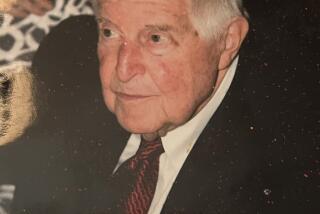David N. Henderson, 82; N.C. Lawyer Served...
- Share via
David N. Henderson, 82; N.C. Lawyer Served 16 Years in Congress
David N. Henderson, 82, a former congressman for North Carolina who helped create Cape Lookout National Seashore during 16 years in the House of Representatives, died Tuesday in Wilmington, N.C. The cause of death was not announced.
Born on a family farm in Hubert, N.C., Henderson graduated from Davidson College. During World War II, he served with the U.S. Army Air Forces in Asia and the Pacific. After the war, he earned his law degree at the University of North Carolina.
Henderson, a Democrat, was chief staffer in 1952 for an investigating subcommittee chaired by then-Rep. John F. Kennedy.
Henderson was elected to the House in 1960, representing North Carolina’s 3rd District, and later chaired the Post Office and Civil Service Committee. With Sen. B. Everett Jordan (D-N.C.), Henderson co-sponsored legislation creating Cape Lookout National Seashore along the Outer Banks.
Henderson chose not to seek reelection in 1977 and joined Marlow Cook, a former U.S. senator from Kentucky, in private law practice in Washington, D.C. He retired from the law firm in 1987 and returned to North Carolina.
#S#
J.K. McEldowney, 97; Florist Made Movie After Wife Dared Him
J. Kenneth McEldowney, 97, an innovative florist and real estate agent who took his wife’s dare to produce a better movie, creating a classic called “The River,” died Jan. 5 in his home in Burbank after a long illness.
Born in Chicago, McEldowney moved to Los Angeles as a child, studied business administration at UCLA, and created a chain of four florist shops. He built a drive-through florist shop and provided flowers for such Hollywood events as the first Academy Awards in 1929 and Jean Harlow’s funeral.
When McEldowney complained to his wife, an MGM publicist, about one of her studio’s films, she dared him to do better. So he sold their home and floral shops and, from 1947 to 1951, labored to produce a motion picture from British author Rumer Godden’s romantic autobiographical novel set in colonial India. “The River” became the first Technicolor movie made in India.
Although McEldowney employed amateur or little-known actors, he could rely on Godden as screenwriter and legendary director Jean Renoir, son of the French impressionist painter. McEldowney’s publicist wife landed magazine coverage in Life, the Saturday Evening Post and others.
The movie opened in New York with a record 34-week run at reserved-seat prices and was on several 10-best-movie lists in 1951.
McEldowney told The Times years later that his film, seen around the world, quickly made more than $16 million. But he turned to real estate and never made another movie because, he said, “I did it once. I proved my point.”
#S#
Allen H. Miner, 86; TV and Film Writer, Director and Producer
Allen H. Miner, 86, a writer, director and producer who worked on such television series as “Wagon Train,” “Perry Mason” and “The Untouchables,” died Jan. 4 of natural causes in San Marcos, Calif.
A Yale University graduate in fine arts, Miner was a combat photographer during World War II, making newsreel footage of beachhead battles in the South Pacific. His camera recorded Gen. Douglas MacArthur’s landing in the Philippines.
Gravitating to Hollywood after the war, Miner wrote for such popular early TV series as “Wagon Train” and “Westinghouse Desilu Playhouse,” and directed several of those series’ episodes. He also directed and produced films in that period, including “The Naked Sea” in 1955 and “Black Patch,” starring George Montgomery, in 1957.
Miner went on to direct popular television series in the 1960s and ‘70s, including “Route 66,” “The Legend of Jesse James,” “Mission Impossible” and “Then Came Bronson.” He also wrote and directed the 1968 film “Chubasco,” starring Richard Egan and Susan Strasberg.
More to Read
Get the L.A. Times Politics newsletter
Deeply reported insights into legislation, politics and policy from Sacramento, Washington and beyond. In your inbox twice per week.
You may occasionally receive promotional content from the Los Angeles Times.









